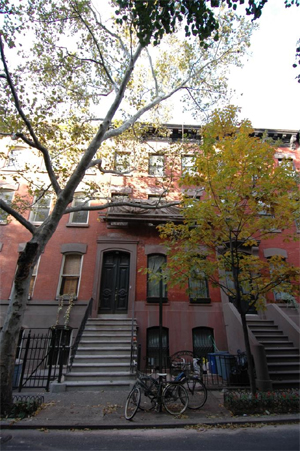A few weeks ago, the real estate world was abuzz with rumors that “Sex and the City” star Sarah Jessica Parker was the mysterious buyer of an $8.45 million townhouse at 17 Prospect Park West in Park Slope.
After all, the thinking went, the buyers used a corporate name, Harken Pretty LLC, that sounded remarkably similar to Parker’s Pretty Matches Productions. And who, other than a celebrity, would form a limited liability company simply to buy a home?
A lot of people, it turns out. The buyer of the mansion turned out to be a Google engineer who wanted to conceal the sale price from less well-compensated colleagues, the New York Times reported. The sale is one of a growing number of anonymous real estate purchases, brokers say, in an environment where ostentatious spending is now considered déclassé.
“We have been asked to sign more confidentiality agreements in the past two quarters than in the last five years,” said Nikki Field, a senior vice president at Sotheby’s International Realty. “No one wants anyone else to know that they have the cash to spend.”
In the past, anonymous purchases were mostly limited to celebrities and the super-rich. Since all real estate sales in New York are now public information, celebrities often create limited liability companies specifically for the purpose of buying real estate, said real estate attorney Steven Sladkus, a partner at Wolf Haldenstein Adler Freeman & Herz. To do that, they often select a business associate to be listed as the principal of the LLC, so the buyer will not be named in public records.
“They do it for privacy reasons,” Sladkus said. “They don’t want people hanging outside their front door. They don’t want to be stalked in the lobby.”

Non-celebrities, on the other hand, have generally not bothered with such secrecy, eagerly trading real estate tips and war stories.
In the flush times of the mid-2000s, “people were very comfortable telling each other they were buying,” Field said. “It was a right of New York passage. You traded up on real estate.”
That all changed with the fall of Lehman Brothers. Now, Field said, confidentiality agreements — where brokers must conceal the identities of the parties they’re working with — are popping up among purchases in the $5 to $10 million range, which is considered middle-of-the-road for New York City, with the average price of an apartment coming in at just over $1 million. Meanwhile, more and more non-celebrity buyers are forming LLCs to buy real estate.
“You’re seeing more A-B-C names, corporate names, she said. “The person who wants to buy publicly is few and far between right now.”
When a five-bedroom, 8,300-square-foot penthouse at the Time Warner Center sold in June for $37.5 million, it was bought anonymously under the name Southerndown, Inc. An entity known only as 163 E. 73 ST. LLC picked up a townhouse at 163 East 73rd Street for $5.8 million, according to Streeteasy.com, while another townhouse, this one at 67 Charles Street in the West Village, went for $8.25 million to a buyer known as 67 Charles Street LLC.
Field attributes the alphabet soup to a climate where Wall Street bonuses are harshly criticized, layoffs are common and ostentatious luxury is out.
“There’s a real sensitivity to shopping big,” Field said.
That makes it awkward for buyers who are still flush with cash and want to capitalize on discounted prices to snap up real estate.
“They want to take advantage of the best buying opportunity they’ll see in their lifetime, but on the other hand, they do not want to be seen as spending money in this environment,” she said. “Too many of their friends are in a position where they can’t do that now.”
For an extra layer of privacy, Sladkus the real estate attorney said, some buyers are going so far as to transfer some of their equity into the hands of an associate or nominee so that the purchaser is not listed as one of the equity holders in a transaction. “That makes it even one more step removed,” he said.
Buying anonymously has also become a bargaining tactic in an environment where many sales now involve protracted negotiations, said Ric Swezey, a senior associate at the Corcoran Group. Some moneyed buyers set up LLCs, he said, to prevent the seller from inflating the price once they realize how wealthy the bidder is.
Swezey himself formed an LLC to make an anonymous purchase of the apartment next door to his. Since buyers are often known to pay higher-than-market prices for abutting apartments, he said, shielding his identity from his neighbor helped him get a better price.
“We didn’t want the sellers to charge us more, or not be as a negotiable,” Swezey said. “So we had the LLC come in and purchase it, so the owner never knew the name of the person who was purchasing it.”
Setting up the LLC was easy, he said — it took less than a week and cost under $1,000. “It was definitely worth the small investment,” he said.
But buying on the down-low isn’t an option for everyone, Swezey said. It’s much easier in condos than co-ops, because co-op boards require interviews with the buyer. Some co-ops strictly prohibit purchases by trusts or LLCs, even when they know who the buyer is, he said.
And in the age of Ponzi schemer Bernard Madoff, it’s not just buyers who want to remain anonymous.
Field said she currently has a contract out on a property owned by a “hugely well-known family,” and the buyer has no idea who the seller is.
“No one has a clue who owns it,” she said. “There are very impressive deals happening right now, but it’s almost impossible to track down who’s doing them.”
